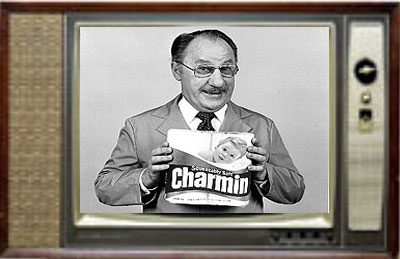
Thursday, June 4
Not so long ago, the object of the most intense consumer demand was the mobile phone. Right now, it is apparently toilet paper.
It’s all very symptomatic. Mobile phones can be used to take selfies, the embodiment of self-centeredness. But they are largely used for communications with others: text messages and e-mail, posting musings on Twitter, and uploading photos for others to see on sites such as Facebook, Instagram, and Pinterest.
In contrast, toilet paper is consumed in moments of extreme isolation. And that’s what everyone is most preoccupied with at present: isolation, aloneness. The lonely crowd in the loo.
What if we run out? Then I will be stuck there, all alone with no way to clean myself off. Better stock up.
Once long ago, Procter & Gamble won notoriety for its ads featuring fictional supermarket manager Mr. Whipple who scolded customers for “squeezing the Charmin.” Weird and perhaps even disgusting. We didn’t usually talk about such things back in the early ‘60s.
Now, there’s no need to advertise at all. TP sells itself.
Phones, and particularly mobile service carriers, advertise relentlessly. Apple touts its latest iPhone models. T-Mobile and Verizon flood the airwaves with competing service offers.
The incessant ads suggest that there is still a lot of competition in this field—but also, maybe, that the market is saturated. Providers have to keep advertising to get consumers to switch devices or carriers in pursuit of low prices and deals, but also to upgrade to the latest technological innovations. The ads tell folks that they are disgracing themselves, the phones they are carrying around are shamefully obsolete.
Apple’s iPhone ads illustrate the truly astonishing level of photos that you can get with their little gadgets. Google and Samsung’s android devices struggle to keep up.
Of course, there’s no tech with toilet paper. It’s not quite a commodity, in the way of certain raw materials. With a commodity, the product from one supplier is pretty much indistinguishable from the product of another suppler. But in the current scarce TP market, differences don’t matter much. Scott’s no-frills TP will do, even if you’d rather have the plusher Cottonelle.
Have I gone on enough about this?
I am, I admit, rather obsessed with mobile phones, which I dislike. New York City has stoked this feeling—and an abhorance of the pedestrians who walk about with phones glued to their eyes and ears, oblivious of all else around them. People staring at the screens or even continuing loud phone conversations while getting onto crowded elevators. No, I don’t really need to hear your argument with your mother, thanks.
I’m not the only one who’s unhappy with our gadget obsession. In the 2013 Spike Jonze movie Her, probably now forgotten, the Joaquin Phoenix character falls in love with his phone’s Siri-like virtual assistant. But the film also portrays a phone-mad society, with waves of people all cemented to their devices as they exit from a public-transit station.
That was a matter of concern seven years ago. What would a socially conscious movie of today focus on? Any thoughts, Mr. Whipple?
Tonight’s dinner: lentil soup and a green salad.
Entertainment: more episodes of Belgian policier The Break.
